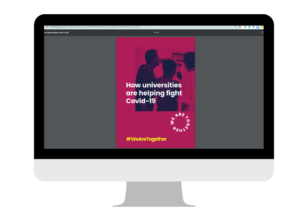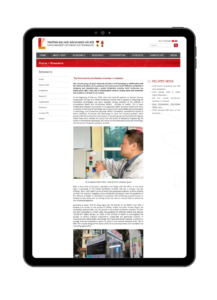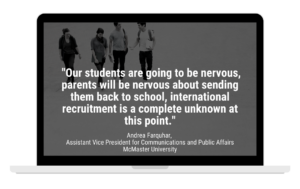Universities have rightly been focused in the initial phase of the Covid-19 pandemic on reacting to fast-changing circumstances; great work has been done in promoting contributions to society and to their research effort.
University communicators and reputation managers are now looking at the next stage of activities to reflect the different phases of the pandemic response
Government relations

Engaging with governments to help steer decision-making that affects universities has been a key priority for many institutions. Issues being addressed as part of lobbying efforts include the extent and timing of lockdown restrictions and the level of financial support available to different sectors.
Much of the more visible lobbying is being undertaken by sector groups such as Universities Australia and Universities UK, which has very publicly launched a plea for a major package of financial support, alongside strong campaigning focused on the impact of universities during the pandemic.
In addition to sector-wide initiatives, many individual universities have been heavily engaged with government to help steer the response. Early results from the World 100 Reputation network survey of responses to the pandemic show a significant focus on government relations as part of the communications response (look out for the forthcoming webinar which will share the results in greater detail).
Country reputation

Another interesting development in Australia is the setting up of Taskforce focused on ‘a Global Reputation’ by the Council for International Education, with strong representation from universities. With such a strong focus on the impact on global universities of the threat to international student recruitment, this is a telling recognition of the vital importance of reputation.
Elsewhere, there is a growing sense that some countries have managed the pandemic more effectively, and may, therefore, have more positive messages to sell to potential international student in the future.
New Zealand, for example, has been prominent in claiming to have ‘stopped a wave of devastation’, although it is still being cautious about opening up education settings.
Vietnam, meanwhile, has reported no deaths related to the pandemic. It makes you wonder whether Vietnamese students may not be travelling abroad in a hurry? One of Vietnam’s top universities, HUST, Hanoi University of Science and Technology, has also just been placed 33rd in the new THE Impact rankings for ‘affordable and clean energy’. It has also created the first mobile disinfection Tardis-like chamber in Vietnam to disinfect clothes and skin.
Easing restrictions
In recent days, many countries have been turning their attention to the process of winding back restrictions if the scientific advice supports it. However, it is a noticeable that universities are not at the top of the list.
The THE quotes Jesper Langergaard, director of Universities Denmark as saying “Right now, the universities are not first in line when it comes to reopen[ing] society”. Universities closed their campuses in mid- March, and despite kindergartens and primary schools reopening already, it will not be until mid-May at the earliest that
Similar approaches have been announced elsewhere in Europe, including Germany and France, with schools being prioritised. There is some comment that universities have become victims of their own success in rapidly moving teaching online, which has proved more challenging for schools, with particular concerns about the impact on inequalities.
The next set of communications challenges
Many universities have now weathered the first communications storms of the pandemic, with new processes established and clearer lines of engagement set up.
Andrea Farquhar, Assistant Vice President for Communications and Public Affairs at McMaster University, argues that we should now be starting to focus on the next major set of communications challenges that are fast approaching.
“We now need to be thinking about what your next academic term is going to look like – is it online, will students be back on campus, can research enterprises get started?” says Andrea, who also chairs the World 100 Network.
Critical to the response of universities is the input from communications professionals to push colleagues to start thinking about the engagement challenges strategically.
“Our students are going to be nervous, parents will be nervous about sending them back to school, international recruitment is a complete unknown at this point.
Andrea says that amongst the key challenges for this next period will be helping to organise your university to reach out to students and parents to give them opportunities to see what an online experience might be.
“It is really important for communications to be at the table in these discussions”, concludes Andrea. “And they need to commence now, not the day before classes start.”
We will be sharing more insights from colleagues around the world on responses to the pandemic through regular blogs, webinars, and social media. Share your experiences on the LinkedIn University Communications community.

